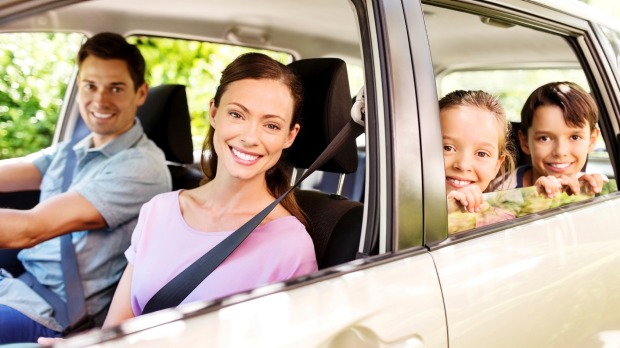
SPONSORED ARTICLE
Roadtripping with kids can be fun. Here's 12 tips on how to keep the kids (and therefore you) happy on a long road trip.
Plan ahead: The secret to successful road tripping with kids is to plan ahead and not try to go too far in one session. Allow twice as long for the journey as you normally would, allocating plenty of time for rest breaks. Plan rest stops in advance (you are the best judge of how long your kids can cope being strapped in a seat), then make a second plan of alternative stops in between, in case you need them.
Rest stops: Not all rest stops are created equal. Wherever you stop should have toilets, but try to choose places with playgrounds or at least some grass where the kids can run around and burn off energy. Most towns have parks with all of the above, as well as picnic tables and shade – it's worth the five extra minutes to detour off the highway to find one. Bring games (inflatable balls are a good space saver) to play with. In NSW the RMS has a map of roadside rest areas with details of facilities: search for "rest area map" at rms.nsw.gov.au. Similar guides are also available from the RACV for Victoria and at qld.gov.au for Queensland.
Map it out: Make a map of your trip (use Google Maps or get an old-fashioned paper map from your auto club) and get the kids involved in planning your trip – let them pick a couple of things they'd like to see and do along the way. School-age kids can follow the map during the journey and decorate it with drawings or stickers of what they see (or keep a journal/scrapbook) as they go. Journeyjottings.com has some great pictorial maps of Australia that are perfect for this. If the kids are old enough, let them navigate and then they can answer your "are we there yets".
BYO snacks: Road food is often atrocious, unhealthy and expensive. Pack healthy snacks, sandwiches and drinks – but go easy on the sugar and anything that can spill or stain. Avoid roadhouses and the temptation to load up on junk and sweets if you can – if things get desperate save roadhouse "treats" as a bribe.
Pack a survival bag: Put everything you might need – change of clothes, towel, swimmers, jumpers, torch, even pyjamas – in a bag to carry in the car to save repacking the boot every time you need something.
First aid: Carry a good first aid kit and medication if your kids get car sick – make sure you dose them up before you hit the road, not once they feel unwell. Carry a plastic bucket (with a lid) and plenty of wet wipes just in case.
Games and toys: Pack lots of toys and games. Don't even think about asking them to share – let each child have his or her own bag of things to play with, but avoid books if your kids are prone to motion sickness and anything hard, sharp or hard to clean if spilt (or doodled) on upholstery. For toddlers, felt is your best friend.
Postcards and treasure hunts: A fun way to pass the time is to collect postcards at each town you drive through. Buy a book of stamps before you leave home and the kids can post them off on the spot. Another option is to create a treasure list of things to find at each stop.
Tell tales: It's not often the kids get your undivided attention so make the most of the opportunity to engage in a long conversation with them. Have a story-telling competition or make it a team effort, where each person adds a line. Read them a book, listen to an audio book or podcast some children's stories from iTunes. Don't underestimate the power of old-fashioned games like I-spy, spelling bees, word games, "who am I" and so on – the internet is full of quirky suggestions, just Google "road trip games". If all else fails, portable DVD players are a lot cheaper than they used to be and most run via the 12-volt outlet in the car – don't forget headphones.
Get wet: If it's a summer road trip try to make at least one stop each day at a council pool or beach, even if it means a small detour. It will make the journey seem more like a holiday, less like a commute.
Ride in the back: If there is room, spend a bit of time in the back seat with the kids. It will help break up any squabbles, and relieve the loneliness if your child is riding in the back by his or herself.
Avoid driving at night: In theory, the idea that driving through the night will mean the kids sleep while you motor in peace is a tempting proposition, but in reality you'll just end up dog tired the next day while they are full of beans. Driving in the dark on country roads also means that the chance of colliding with wildlife is high.